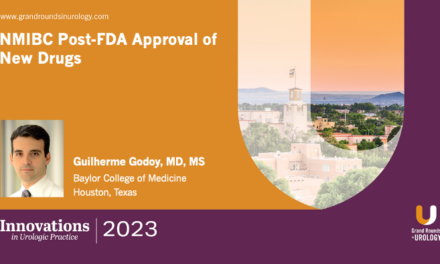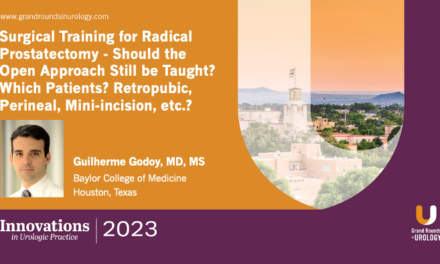Aditya Bagrodia MD, FACS, presented “Testicular Cancer” during the 30th Annual Perspectives in Urology: Point-Counterpoint, on March 10, 2023, at Humphreys Half Moon Inn, San Diego, California.
How to cite: Bagrodia, Aditya. “Testicular Cancer.” March 10, 2023. Accessed Jul 2024. https://grandroundsinurology.com/testicular-cancer/
Testicular Cancer – Summary
Aditya Bagrodia, MD, FACS, discusses testicular cancer in this lecture. Dr. Bagrodia explains that, though it is highly curable, testicular cancer is the most common cancer in men ages 18-45 and results in the most life years lost for non-pediatric cancers.
Dr. Bagrodia asserts that delays in diagnoses are associated with worse clinical outcomes. He says it is paramount to minimize toxicity while maintaining excellent oncological outcomes. The United States Preventive Services Task Force (USPSTF) recommends against screening for testicular cancer but if a patient has risk factors, self-exams are warranted.
Dr. Bagrodia covers signs and symptoms, the most common being abdominal, back, or flank pain and emphasizes that the scrotum should be checked in patients with an abdominal/retroperitoneal mass. He summarizes scrotal evaluation and explains that with a suspicious scrotal mass, ultrasound and serum tumor markers should be obtained (ideally getting staging scans prior to orchiectomy).
Dr. Bagrodia addresses prosthesis placement, fertility concerns, sperm banking, and anxiety and depression as topics practitioners should address with men who have a testicular cancer diagnosis. He addresses strategies to avoid a full orchiectomy before turning to post-orchiectomy procedures, emphasizing the importance of following serum tumor markers to nadir and a high-quality, contrasted CT scan.
Dr. Bagrodia explains stage one and stage two seminoma treatment principles and asserts that for patients undergoing both radiation and chemotherapy, the risk of long-term toxicity is significant. He explains efforts to minimize toxicity and summarizes the Surgery for Early Stage Metastatic Seminoma (SEMS) study. Dr. Bagrodia addresses stage two nonseminoma and emphasizes novel strategies to limit toxicity before concluding with a final emphasis on the curability of testicular cancer as well as the significant toxicities associated with its treatment. He asserts that efforts to minimize long-term side effects in early-stage disease are mandatory.
About the 30th Annual Perspectives in Urology: Point Counterpoint conference: Presented by Program Chair and Grand Rounds in Urology Editor-in-Chief E. David Crawford, MD, this conference brought together leading experts in urology, medical oncology, and radiation oncology to discuss and debate the latest topics in genitourinary cancers, primarily prostate cancer and bladder cancer. This interactive conference offered topical lectures, pro/con debates, interesting-case presentations, interactive panel discussions, and interactive audience and faculty networking.
ABOUT THE AUTHOR
Aditya Bagrodia, MD is an Associate Professor and genitourinary oncology disease team leader in the Department of Urology at UC San Diego Health.
Dr. Bagrodia earned his medical degree from the University of Tennessee Health Sciences Center, graduating with highest honors. He was awarded a Doris Duke Clinical Research Fellowship in clinical research at UT Southwestern Medical Center where he completed his residency in urology. Dr. Bagrodia completed a fellowship in urologic oncology at Memorial Sloan Kettering Cancer Center, where he received an American Urological Association Urology Care Foundation Research Scholars Grant.
Dr. Bagrodia’s clinical practice comprises all urologic malignancies including adrenal, upper tract, renal, bladder, prostate, penile, and testicular cancers. He has expertise in complex multidisciplinary management and minimally invasive approaches to urologic surgery.
Dr. Bagrodia’s clinical and research focus is on patients with germ cell tumors. His laboratory centers on sequencing efforts to understand tumor evolution and heterogeneity in germ cell tumors as well as to identify novel biomarkers to recognize occult metastatic disease. On the clinical side, Dr. Bagrodia is actively involved with understanding and overcoming unique socio-epidemiological considerations that adversely impact oncologic outcomes in patients with germ cell tumors. He is also the principal investigator for several germ cell tumor-directed clinical trials.
Dr. Bagrodia has conducted extensive research in urologic oncology, primarily in biomarker profiles and molecular signatures of urologic tumors as predictors of clinical outcomes. He is funded through competitive grants from the Cancer Prevention and Research Institute of Texas (CPRIT), intramural grants, and NIH funding.
Dr. Bagrodia is the principal author or co-author of more than 190 articles, including more than 50 articles devoted to germ cell tumors, in peer-reviewed publications such as the Journal of Clinical Oncology, Nature Genetics, European Urology, and the Journal of Urology. He is also the co-host of Backtable Urology, a podcast devoted to the practical education of urology providers.



